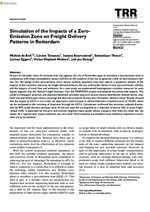The impacts of a Zero-Emission Zone on city logistics in Rotterdam

Image by Unsplash, Amy Dekker
HARMONY partners Delft University of Technology, Significance, and the City of Rotterdam recently published the paper “Simulation of the Impacts of a Zero-Emission Zone on Freight Delivery Patterns in Rotterdam” in the Journal of the Transportation Research Board.
How is HARMONY supporting Rotterdam?
Rotterdam has committed to reducing CO2 emissions by 49% by 2030. As part of a broader vision for emission-free city logistics, the city of Rotterdam plans to introduce a Zero-Emission Zone (ZEZ) in combination with urban consolidation centers (UCCs) on the outskirts of the city to generate a shift to zero-emission vehicles.
Urban freight is one of the domains covered in HARMONY, and for this domain a Tactical Freight Simulator (TFS) is being developed and applied to a ZEZ case study In the case study, heterogenous transition scenarios for each logistic segment into the TFS were implemented, and the system-wide impacts were analyzed. This model is multi-agent, empirical, and shipment based and simulates long-term and short-term tactical choices.
What have we learned?
Results confirmed that emissions reduced dramatically, by 90%, inside the ZEZ. At the city scale, this corresponds to a reduction of almost 10%, as most freight-related traffic is generated by the port and involves long-haul heavy goods vehicles that now do not enter the city center.
Another interesting finding was a small increase of +0.25% in vehicle kilometers traveled overall, which can be attributed to the rerouting of shipments through the UCCs.
Finally, HARMONY’s TFS proved effective in addressing a complex ZEZ city logistics scenario within a UCC. The level of detail in the multi-agent model also permits assessment of different transition paths to ZEZ vehicles for each logistics segment, to better account for the heterogeneity in preferences of different actors. This provides a better empirical basis for informed decision-making.
However, to achieve this policy objective, more measures are needed, for instance to decarbonize long-haul freight transportation, which constitutes a large part of the emissions in the study area.
You can read the full paper on the HARMONY publications webpage.
Author: ENIDE SOLUTIONS









